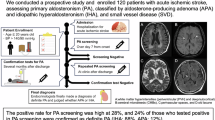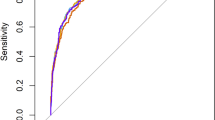Abstract
Total small vessel disease (SVD) score is used to measure the burden of SVD by incorporating four established neuroimaging markers; white matter hyperintensity, lacune, cerebral microbleed, and enlarged perivascular space, ranging from 0 to 4. Whether total SVD scores predict all vascular outcomes remains unclear. This study aimed to clarify the predictive value of the total SVD score for incident stroke, mortality, and acute coronary syndrome in independent outpatients with vascular risk factors. We derived data from The Tokyo Women’s Medical University Cerebrovascular Disease registry, a prospective observational registry in which 1011 patients with evidence of cerebral vessel disease on magnetic resonance imaging were enrolled. They were followed up until March 2023. The primary outcomes were stroke, all-cause death, and acute coronary syndrome (ACS). After excluding those with a modified Rankin scale score >1, Mini-mental State Examination score <24, and missing T2* images, 692 patients were included. During a median follow-up period of 4.6 years, stroke, ACS, and all-cause death occurred in 52, 24, and 45 patients, respectively. In multivariate analysis, the total SVD score was independently associated with stroke, and all-cause death but not with acute coronary syndrome. Both cutoff values of the total SVD score for stroke, and all-cause death were 1. In conclusion, the total SVD score could predict stroke and mortality but not acute coronary syndrome. Our results suggest intensive management of patients with a total SVD score ≥1 to prevent stroke and all-cause death.

Patients with higher total SVD scores were significantly more likely to have a stroke (A; P = 0.012) than those with lower total SVD scores. However, no association was observed between total SVD scores and acute coronary syndrome (B, P = 0.604). For incident stroke, total SVD scores of 1 and 2 were the cutoff levels.
This is a preview of subscription content, access via your institution
Access options
Subscribe to this journal
Receive 12 print issues and online access
$259.00 per year
only $21.58 per issue
Buy this article
- Purchase on SpringerLink
- Instant access to the full article PDF.
USD 39.95
Prices may be subject to local taxes which are calculated during checkout




Similar content being viewed by others
References
Wardlaw JM, Smith C, Dichgans M. Small vessel disease: mechanisms and clinical implications. Lancet Neurol. 2019;18:684–96.
Duering M, Biessels GJ, Brodtmann A, Chen C, Cordonnier C, de Leeuw FE, et al. Neuroimaging standards for research into small vessel disease-advances since 2013. Lancet Neurol. 2023;22:602–18.
Staals J, Makin SD, Doubal FN, Dennis MS, Wardlaw JM. Stroke subtype, vascular risk factors, and total MRI brain small-vessel disease burden. Neurology. 2014;83:1228–34.
Yakushiji Y, Charidimou A, Noguchi T, Nishihara M, Eriguchi M, Nanri Y, et al. Total small vessel disease score in neurologically healthy Japanese adults in the Kashima Scan Study. Intern Med. 2018;57:189–96.
Lau KK, Li L, Schulz U, Simoni M, Chan KH, Ho SL, et al. Total small vessel disease score and risk of recurrent stroke: Validation in 2 large cohorts. Neurology. 2017;88:2260–7.
Song TJ, Kim J, Song D, Yoo J, Lee HS, Kim YJ, et al. Total cerebral small-vessel disease score is associated with mortality during follow-up after acute ischemic stroke. J Clin Neurol. 2017;13:187–95.
Yilmaz P, Ikram MK, Niessen WJ, Ikram MA, Vernooij MW. Practical small vessel disease score relates to stroke, dementia, and death. Stroke. 2018;49:2857–65.
Suzuyama K, Yakushiji Y, Ogata A, Nishihara M, Eriguchi M, Kawaguchi A, et al. Total small vessel disease score and cerebro-cardiovascular events in healthy adults: The Kashima scan study. Int J Stroke. 2020;15:973–9.
Del Brutto VJ, Mera R, Recalde BY, Rumbea DA, Costa AF, Del Brutto OH. Total cerebral small vessel disease score and all-cause mortality in older adults of Amerindian ancestry: The Atahualpa Project. Eur Stroke J. 2021;6:412–9.
Su Y, Guo Y, Chen Z, Zhang M, Liu J, Wang Q, et al. Influence of pre-existing cerebral small vessel disease on the outcome of acute cardioembolic stroke: a retrospective study. Neuropsychiatr Dis Treat. 2022;18:899–905.
Kubota M, Iijima M, Shirai Y, Toi S, Kitagawa K. Association between cerebral small vessel disease and central motor conduction time in patients with vascular risk. J Stroke Cerebrovasc Dis. 2019;28:2343–50.
Fazekas F, Chawluk JB, Alavi A, Hurtig HI, Zimmerman RA. MR signal abnormalities at 1.5 T in Alzheimer’s dementia and normal aging. AJR Am J Roentgenol. 1987;149:351–6.
Debette S, Schilling S, Duperron MG, Larsson SC, Markus HS. Clinical significance of magnetic resonance imaging markers of vascular brain injury: a systematic review and meta-analysis. JAMA Neurol. 2019;76:81–94.
Iijima K, Akishita M, Ouchi Y. Coronary artery calcification and cerebral small vessel disease. Association of systemic atherosclerosis. Circ J. 2011;75:272–3.
Kitagawa K. Blood pressure management for secondary stroke prevention. Hypertens Res. 2022;45:936–43.
Funding
This study was supported in part by Research Funding of Longevity Sciences (28–15, 30-1) from the National Center for Geriartrics and Gerontology, Japan.
Author information
Authors and Affiliations
Corresponding author
Ethics declarations
Conflict of interest
Dr. Kitagawa received personal fees from Kyowa Kirin, grants and personal fees from Daiichi Sankyo, and grants from Bayer and Dainihon Sumitomo outside the submitted work. Other authors have no conflicts of interest to disclose.
Additional information
Publisher’s note Springer Nature remains neutral with regard to jurisdictional claims in published maps and institutional affiliations.
Supplementary information
Rights and permissions
Springer Nature or its licensor (e.g. a society or other partner) holds exclusive rights to this article under a publishing agreement with the author(s) or other rightsholder(s); author self-archiving of the accepted manuscript version of this article is solely governed by the terms of such publishing agreement and applicable law.
About this article
Cite this article
Kitagawa, K., Toi, S., Hosoya, M. et al. Small vessel disease burden predicts incident stroke and all-cause death, but not acute coronary event. Hypertens Res 47, 3001–3009 (2024). https://doi.org/10.1038/s41440-024-01797-2
Received:
Revised:
Accepted:
Published:
Version of record:
Issue date:
DOI: https://doi.org/10.1038/s41440-024-01797-2
Keywords
This article is cited by
-
Brain and hypertension: from sympathetic outflow to brain-focused blood pressure management
Hypertension Research (2026)
-
Integrative genetic analysis of shared genetic architecture of stroke and coronary artery disease: implications for pharmacist-led precision medicine
International Journal of Clinical Pharmacy (2025)
-
Asian hypertensive population: key insights from large-scale data analysis
Hypertension Research (2024)
-
Distinct pathophysiology of small vessel disease from atherosclerosis
Hypertension Research (2024)



